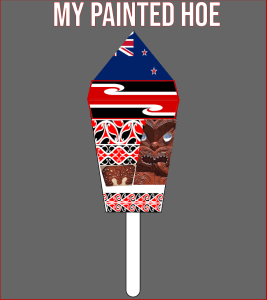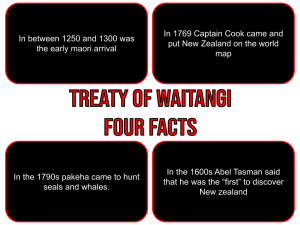Here are some facts about the Whakairo! It is the facts for this week that me and my class are doing!
My painted Hoe
 Here is my painted Hoe design task! I got some images and cropped them so they could fit!
Here is my painted Hoe design task! I got some images and cropped them so they could fit!
Exploring the Pacific. Response to text
Polynesian Explorers
Highlight the correct answer, or type in what you think is correct.
- When, and where was Tupaia born?
- a) Around 1825 in Rā‘iātea
- b) Around 1725 in New Zealand
- c) Around 1825 in New Zealand
- d) Around 1725 in Rā‘iātea
- Rā‘iātea is a part of which larger group of islands?
- a) Samoa b) Tahiti
- c) Rapa Nui d) Micronesia
- What was the name of the British official sent to secure British rule over NZ?
- a) William Johnson b) Abel Tasman
- c) William Hobson d) Captain James Cook
- One day, more people would come – a different kind of people altogether. They would arrive on a canoe with no outrigger and would change everything: “And this land will be taken by them” Vaita said.
Did this prophecy come true? Explain.
→It did come true so Vaita and his people took over Tahiti then Tupaia left Tahiti.
- Only about 20 of the painted hoe that were given to Captain Cook in 1769 by Māori survive.
- a) True b) False
- Describe the role that Tupaia had on board the Endeavour – what did he do on Captain Cook’s ship?
→He helped Captain Cook get to different places.
| WORD | DEFINITION | YOUR OWN SENTENCE |
| interpreter | a person who interprets, especially one who translates speech orally or into sign language. | He was an Interpreter. |
| diplomat | an official representing a country abroad. | She was doing research about a diplomat. |
| indigenous | Native people or Native animals. | He was studying indigenous people in class. |
- Explain the four reasons why Hoe were important, and special pieces of technology for Maori.
→ Because you could use it to make your boat speed faster.
→ And you could also use it as weapons.
→ They were also used for collecting and transporting food.
→ You could also use it as shovels.
- Tupaia (up until recently) and much more Polynesian history remains oral history (that means told by speaking). How can we ensure that this history is available to learn for future generations? Try to come up with at least 2 ways.
→ We can tell his story to everyone and we can put him up in more museums so people can learn about him.
Statistics
Here is my maths for this week. it is still about tally charts but there is different kinds of charts this time.
Writing task (grammar)
Here is my writing for this week! it is to improve my writing skills using grammar. It was an easy one to do since ive done writing tasks like this before.
Tally chart and Addition practice
This is my Math about tally charts and Additon.
The Treaty of Waitangi response to text
Treaty of Waitangi
Highlight the correct answer, or type in what you think is correct.
- When did Maori first arrive in Aotearoa, New Zealand?
- a) Between 1150 & 1200AD
- b) Between 1250 & 1350AD
- c) Between 1250 & 1300AD
- d) Last Year
- In the 1790’s Pakeha arrived in NZ to do what?
- a) Hunt Moa b) Start families
- c) Hunt whale & seals d) Escape prison sentences
- What was the name of the British official sent to secure British rule over NZ?
- a) William Johnson b) Abel Tasman
- c) William Hobson d) Captain James Cook
- There were two things that Maori chiefs Hone Heke Pokai and Tamati Waka Nene thought signing the treaty would help accomplish. What were they?
→They said that signing it was a good thing because it would stop intertribal warfare.
→They also believed that it would make trade between Maori and Pakeha easier and fairer.
- True or False: Te Tiriti o Waitangi and the Treaty of Waitangi are the exact same.
- a) True b) False
- The Waitangi Tribunal was set up in 1975. Describe the job the Waitangi Tribunal have?
→control all recommendations between Maori and the crown, to make sure the British follow the agreement.
| WORD | DEFINITION | YOUR OWN SENTENCE |
| colonisation | when a country takes control
of another country and sends people to live there. |
“There was a colonisation in the mid-1840s to the early 1870s”. |
| treaty | A contract or agreement to make peace between different things. | “I have now signed the treaty”. |
| sovereignty | Absolute and total control of everything. | “From now on I will take sovereignty of your country”. |
- When the treaty was signed William Hobson said out loud “He iwi
tahi tātou.” (“We are one people.”)
What do you think he meant by this?
→I think he meant that there would be no more war between them because they have agreed on something.
- The article describes differences between Te Tiriti and the Treaty of Waitangi – Why do you think those differences caused difficulties?
→ The translation between the Maori and English treaty was not the same but not everyone knew that.
Waitangi day 4 facts
 Here are some facts about the treaty of waitangi.
Here are some facts about the treaty of waitangi.
all the people that are in Mr Hughes class for literacy have to do work about Waitangi day because it was only a few days ago from now!